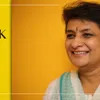How social entrepreneur Natasha Mudhar is making SDGs an everyday conversation in India
Based in London, social entrepreneur Natasha Mudhar’s venture, The World We Want, works with business leaders, NGOs, governments, celebrities, influencers, and philanthropists to fulfill SDGs.
The thing about serving a purpose larger than oneself seems to be that one simply cannot stop at a certain number of tasks, not for Natasha Mudhar at least, especially when she believes a lot needs to be done in her area of focus -- the UN Sustainable Development Goals (SDGs).
In 2015, the UN member states adopted Sustainable Development Goals outlining 17 goals, including reducing poverty and hunger, good health and well-being, quality education, and gender equality, among others.
The same year, Natasha was appointed by SDG advocate and filmmaker Richard Curtis - responsible for films like Love Actually and Bridget Jones's Diary - to popularise it in India.
“The reason we needed to make the goals famous was when you look back at the Millennium Development Goals (MDGs), they pretty much failed. They didn’t really achieve what they were meant to do because I think the MDGs were not well known. The MDGs was a conversation that was held very tightly among the upper echelons of the society - the corporate sector, politicians, and world leaders. But it wasn’t decentralised as a conversation,” she tells HerStory.
With the timeframe of 15 years to achieve the SDGs (2015-2030), Natasha took this upon herself to break down the said goals into household chatter and thus be a part of people’s routine every day, which then translates into bigger changes.
She had been doing so as part of Sterling Global, a global business and communications consultancy firm founded by her mother in the UK.
Since 2018, the work has been carried out through London-based The World We Want, a separate entity that solely focuses on accelerating the SDGs by working with business leaders, NGOs, governments, celebrities and influencers, and philanthropists to curate global movements.
It leverages the concept of storytelling, global collaboration, strategic communications, and positive action to convert awareness of the issues into action.
Building ‘The World We Want’
A for-profit social enterprise, The World We Want operates on strategic partnership with organisations like the United Nations and Bill and Melinda Gates Foundation. It curates various campaigns and events as well as consultancy services to celebrities, influencers, corporate companies, foundations, and organisations to help strategise and use the voice and platforms they have to be a catalyst for change.
Passionate about driving conversations in the global south, the company curated SDGs Impact Summit in New Delhi in November 2019, which Natasha says is like the Davos Forum that focused on developmental issues in the global south. With the leadership position that India holds, she says it has the potential to become the first country to achieve SDGs.
The organisation has also spearheaded international campaigns for social impact films like Toilet: Ek Prem Katha, Padman, and Chhapaak that challenges social evils like acid attacks and taboos surrounding menstruation.
When the COVID-19 pandemic raged on in India, the organisation worked with Bill and Melinda Gates Foundation in India and the Ministry of Health to streamline COVID-19 messaging, collate influencer engagement, and finetune outreach plan to ensure Covid appropriate behaviour and fight vaccine hesitancy.
Further, it launched a music campaign and fundraiser 'We For India: Saving Lives, Protecting Livelihoods' to have the global audience help India in its need during the second wave of COVID-19.
As the venture grew organically as part of Sterling Global initially, it incurred only operation cost as the initial investment.
Moving past imposter syndrome
Both the Sterling Global and The World We Want claim to be guided by the principle of doing well by doing good, the same spirit that saw a couple of generations of women in her family through various challenges.
Her great grandmother was an educationist who used to teach the underprivileged children in a village in Jalandhar, Punjab. Her mother, Teji Singh, started a communications and consultancy business in the 90s London as an immigrant and a single mother.
“It’s not what it’s known for today, for its multiculturalism. It was still a bit of a taboo and a stigma for an Indian woman to be launching a business because that just wasn't considered the right thing for women to do at that stage,” she says.
When her ancestors had to overturn bigger challenges to provide a privileged upbringing for her, Natasha struggled with imposter syndrome.
“I used to hide and play down my accomplishments, especially from my friends and other peers because I didn't want to be that successful woman. I didn't want to feel like the woman who had got it very easy as well,” Natasha shares, adding that she has now learnt to acknowledge and be grateful for the privileges and the work, and celebrate it without making others uncomfortable.
For Natasha, her mother is the biggest inspiration and mentor, and she continues to seek advice from her. According to Natasha, the biggest lesson her mother taught her early in life has been to turn challenges in life into opportunities.
Edited by Megha Reddy







![[Funding alert] AI startup CellStrat raises Rs 1.05 Cr in angel round](https://images.yourstory.com/cs/2/628912e0d7f211eb8e8307e5b6451cf7/CopyofImageTaggingNewBrandingEditorialTeamMaster-2-1642671840897.jpg?mode=crop&crop=faces&ar=1%3A1&format=auto&w=1920&q=75)

